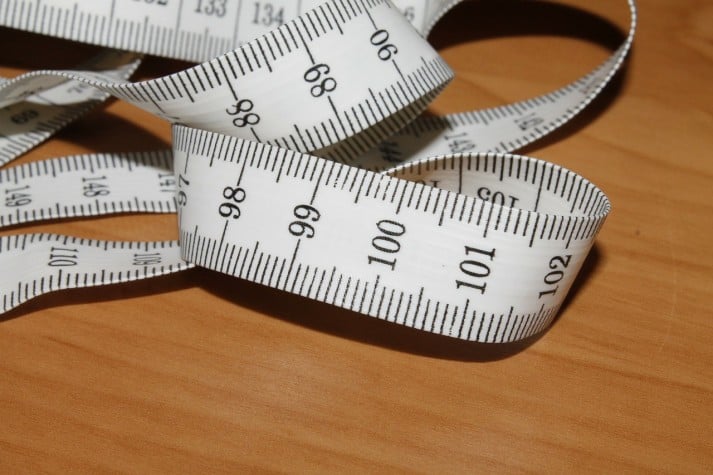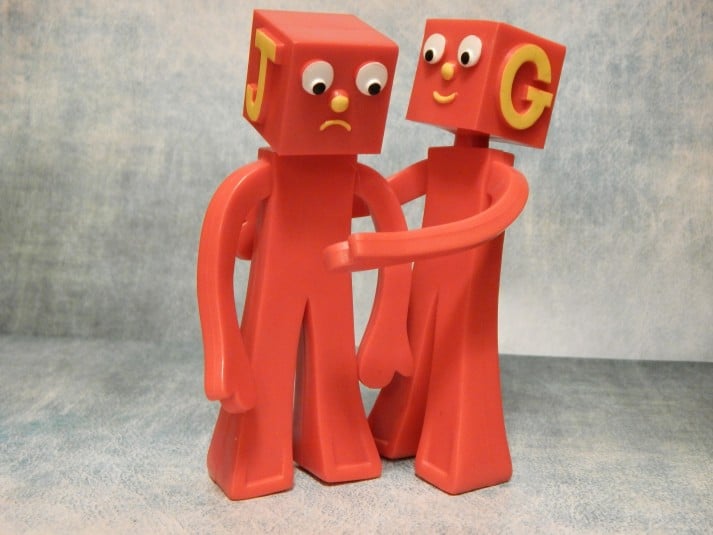This is an article from NF Chief Wordsmith Taylor Share.
Before we jump into this hugely controversial subject, I wanted to lay out some facts. And also put on my Kevlar armor:
- As a nation, we’re overweight. This is a major health crisis.
- There are enormous stigmas against being fat.
- We know fat shaming doesn’t work. Furthermore, it’s harmful.
- Our health as individuals is connected to our health as a society – whether it be in the form of social norms of eating, exercising, or body image, healthcare costs and insurance premiums, or subtle effects on labor markets. We’re all in this together.
There aren’t many things that matter on this scale. That’s why it is especially crappy when nearly every article, debate, YouTube video, or reddit thread on this subject is the same: people talking past one another instead of working with each other.
I believe there is a perspective most people on both sides can embrace, without betraying the values that originally had them at each other’s throats.
Bear with me while I dig in to this. We’re going to put the nerd in Nerd Fitness.
We should all EMBRACE Fat acceptance, with one huge caveat

“Acceptance” is a loaded word. Today I’m going to suggest an incredibly specific, nuanced definition of body acceptance. To get there though, I first need to talk about traffic:
Imagine you are leaving work to go to a friend’s birthday dinner. You swing by and pick up your friend, hop in your car, and head to the party. It starts in twenty minutes, but you hit some traffic. You check Google Maps and it shows an updated travel time: FORTY MINUTES!
We all know what happens from here. You begin to stress. You look at other lanes, trying to calculate the best Frogger-like strategy to get you there sooner. You start looking for alternate routes. Maybe you start texting to apologize, or just get angry and tensions rise in the car.
This is where many eastern philosophies would say suffering begins. The cause? Your attachment to a twenty-minute arrival time. The more you cling on to your twenty-minute arrival time (as you madly check your maps app), the more you get stressed. You’re attached to twenty minutes, but it ain’t happenin’. Life just dealt you forty minutes.
So what’s the alternative?
Non-judgmental acceptance. Truly accept your situation before you decide how to act.
As mindfulness would teach, the sooner we accept the reality (that we’ll be in the car for 40 minutes), the better we can deal with the situation:
Imagine the same scenario (a 40-minute car ride), but you got in you car knowing it would take that long. You let your friend having the dinner know when you would arrive, you picked out a killer playlist, and you thought up some fun conversation topics to catch up with your buddy along the way (you can’t WAIT to ask him about that big fight he had with Becky. Dammit Becky!)
In both cases, what’s REALLY changed? You’re still in the car with your friend, a smart phone, and TIME to connect with your friend who is sitting right next to you. In one case you are miserable and stressing together. In the other case you are catching up and consider the extra time a blessing. Even if there is no “glass half-full” perspective, it doesn’t do you any good to be stressed AND be late. In fact, it could make things worse!
Now, let’s put this into body image terms:
I’m too fat. I’m too skinny. I’m not sure what’s wrong with me; I’m just ugly. I’m a lazy piece of crap. I hate my [body part]. Gross. I wish my [body part] looked like that. Eh, I’m okay I guess. I need to work out more. I have no self-control. What’s the point? I’m just made this way; it’s not my fault. I’m doing the best I can – I can’t do anything else. It’s THEIR fault. Stop blaming me. You don’t know what it’s like. It’s easy for you.
Before we even have a chance to take a non-judgmental assessment of our situation, we jump to judgment. It’s the way our brains work. We look at ourselves, and anyone else, and judgment shows up, uninvited. The problem is, when we couple emotional judgment with our assessment of our body, we lie to ourselves. We tell ourselves we’re ugly, or that we’re perfect, when neither is true. We tell ourselves we don’t need to lose weight, when our doctor tells us we are headed for an early grave. Or conversely, we become obsessed with body image and fail to recognize that we actually ARE healthy. This isn’t just for people with body image problems. These automatic thoughts affect us ALL.
Worse, even if our emotional assessment of our bodies is close to reality, the emotions themselves get in the way of actually moving in the direction we want! If you feel like crap every time you look in the mirror, you aren’t exactly going to have the motivation to follow through for 6 weeks to establish that new healthy eating or exercise habit. After all, life sucks – you suck, remember?
Stress and judgment ultimately prevent us from fixing the things that caused those negative emotions in the first place.
When our brains define a situation as negative in a snap judgment (late, ugly, gross), it can be hard to break free from that framing. We hear “late” and “fat,” and it can be hard not to immediately flood our brain with all of the wrong thoughts.
That’s where “fat acceptance 2.0″ comes in.
Fat Acceptance

When we talk about fat acceptance, let’s be honest: it’s a LOADED phrase. We discussed this topic previously and it had over 350 comments.
But it doesn’t have to be loaded or controversial unless you let it.
When you’re stuck in traffic you need to first “accept” the reality of the situation you’re in. The reality is that it will take 40 minutes to get there. Most of us hear this and start framing the situation immediately in negative terms. We hear the word late and it’s as if we had an injection of stress into our blood:
We’re going to be late. We’re going to miss ____. We’re going to waste all this time sitting around here.
But it doesn’t have to be that way:
- Negative Judgment: We are going to be 40 minutes late.
- Positive judgment: We have 40 minutes of extra time together.
- Neutral, non-judgment: We will arrive in 40 minutes.
Let’s look at this in terms of our own bodies:
- I’m ____ over/underweight. I’m ugly.
- I’m ____ over/underweight. I’m beautiful.
- I weigh ___. My body fat percentage is ____. My other health indicators are ____.
Just by picking one or the other, we have ALREADY secretly decided how we’re going to feel and what we’re going to do about it. But we didn’t really make the choice; our unconscious framing of the situation made it for us.
Being angry or stressed out about our bodies can be a direct impediment to moving in the most useful direction. When we let our self-judgment interfere, we defend that self-judgment at all costs.
In other words, we make irrational decisions and statements:
- “Real women have curves! That woman is a twig. I’m big and beautiful.”
- “Good thing I’m not fat like that person; gross. They should do something about it.”
- “That dude spends too much time in the gym. What a meathead! I’m glad I’m not full of myself like he is.”
The definition of fat/body acceptance I want to see adopted by both sides of this debate starts here: accepting our bodies for what they are: just facts. No extra negativity or overly loud positivity, no knee-jerk reaction to declare how our body shape is superior to other body shapes.
Just quiet, realistic, objective acceptance.
We need to learn to accept our bodies because there is nothing else to do. Once we do this, we can decide, just like in traffic, what the most useful way to respond is. We need to separate these two processes: the labeling and the decision-making. We must separate them because if we don’t, we risk being dragged down by the power of words.
This allows us to make a smart choice, without relying on a reactive one to negative emotions (crash dieting), or a defense mechanism (doing nothing or defending your body type by bringing down others).
This is the incredibly simple concept of accepting reality without judgment, without caveats, without footnotes, without ifs, ands, or buts.
If you weigh 300 lbs, you weigh 300 lbs. Can you think about this fact without becoming instantly stressed, upset, or down on yourself? It’s simple in concept, but far from easy.
If you roll for stats before you begin a RPG, you don’t spend much time stressing about your awful roll or gloating about your 1337 roll (okay, maybe a little time). Rather, you likely accept your roll, and start strategizing. This is what I have to work with. These are my strengths. These are my weaknesses. How can I win given the hand I’m holding RIGHT NOW? In other words, you quickly accept your situation and apply non-judgmental acceptance.
THIS is what makes the game enjoyable – not pouting all game because you only rolled a 4 in Intelligence and you’re a wizard, but rather quietly accepting your hand and playing to the best of your ability.
Do any of these sound familiar?
- This doesn’t apply to me because I have kids, and have no time to work out.
- I’m overweight, but it’s not my fault. I have ____ in my life right now.
- I’m super skinny, but I just can’t gain weight. I’ve tried, and my body doesn’t work that way.
- I have two jobs and go to school (or other busy life) – I’m in a unique situation.
- I have a special _____ injury/medical issue, so this isn’t really relevant for me.
It’s easy to come up with a justification to buck personal responsibility and avoid facing the truth: Only YOU can change YOU. These justifications are often the biggest hurdles to actually making the change we need to make.
The Empire

If you are overweight, buckling down and accepting your “stats” might seem like a Herculean task. That’s because it is – you’re fighting against the Empire after all. Embedded in society and our words are things just make this process of acceptance far more difficult than it should be.
From sensationalized, sexualized (photoshopped) body images thrown at us in TV shows, commercials, and movies, to a food industry promoting overblown portion sizes and food designed at the perfect “bliss point” to make you overeat, the Empire is not to be underestimated.
All of this has been designed to drag you over to the Dark Side.
We desperately need a logical playbook to help to overcome these mental barriers. Consider this a plea to the body acceptance movements and fitness industry alike: stop shaming, stop getting defensive, accept your starting point, and help each other live happier, healthier lives.
The Empire’s influence is real and pervasive, and if we aren’t careful, we’ll end up working against ourselves. We’ll be infighting about what shape looks the best, instead of uniting forces against the people trying to manipulate us all.
We need a body acceptance movement that helps us find strategies to shed negative connotations without replacing them with a belief that glorifies unhealthy lifestyles. We need a fitness industry that doesn’t shame men and woman for their starting point, and accepts a “look” beyond a single idealized version.
We don’t care what you look like. We don’t care where you came from, only where you’re going. In fact, it’s a RULE of the Rebellion!
 Stop fat shaming. And stop glorifying obesity.
Stop fat shaming. And stop glorifying obesity.

When we’re attached to our bodies and can’t accept the reality of our situation, we become defensive. The natural reaction is to say [the way my body is better than the way your body is].
This comes in two major forms:
- The way my body is (overweight) is better than the way your body is (skinny, fit, or anything else). See “real women have curves.”
- The way my body is (not “fat”) is better than the way your body is (anything else). See “strong is the new skinny.”
In the past year, these conflicts have been at an all time high. From the drama of Fat People Hate on Reddit, to ranting on YouTube, fat shaming needs to stop. It’s not cool, it’s not trendy – it’s just wrong. Unless you can prove the science wrong, which says fat shaming actually leads to weight gain, stop pretending you are enacting tough love. You’re not. You’re just being defensive of social norms and your own body image, using the lie of empathy as a smoke screen for cruelty.
But, just like fat shaming is harmful (psychologically AND by extension, for people’s physical health), the movement of glorifying obesity also helps to send people to an early grave.
Obesity is unhealthy. Yes, it’s true the story isn’t as simple as that for EVERYONE (metabolic health being an interesting point). Yes, non-obese people can have metabolic issues and think they’re healthy because they’re small (they’re wrong!).
But we know that being significantly overweight increases the chance that you will end this journey too soon. It’s easy to close our eyes and shout in a comments section “Here’s a link that says however I am right now is healthy.” But we can’t ignore the science. Hell, 95% of parents think their overweight children look “just right.” We can’t afford to let self-judgment (and defensiveness) stand in our way of being healthy and happy.
Just like it is irresponsible and cruel to shame others for being fat (because it hurts people), it is also irresponsible and cruel to promote a lifestyle which encourages or normalizes unhealthy behavior (because it hurts people). In fact, from this perspective these two mindsets are more similar than they are different: They’re both defensive mindsets which ultimately end up hurting people who really just want to be healthy and happy.
Like glorifying smoking in the 60s, we cannot afford to ignore evidence on EITHER side. This is a public health crisis, and we need to be honest with ourselves or millions will continue to suffer and die at an early age.
It’s possible to walk this middle line. In fact, one of my favorite thinkers on this topic, the incredibly articulate boogie2988, an awesome YouTuber and gamer, is a great example:
Both sides of this debate should be in this together. We need to face the Empire as a united front, as two sides in the SAME rebellion… not at each other’s throats, letting the Empire get away with everything!
I propose we start at non-judgmental acceptance. Before we start giving advice to others, or getting down at ourselves, let us try to consider the facts without the emotions of self-judgment, embarrassment, disgust, annoyance, frustration, and anger.
But this is such an important topic, and I want to hear from you:
What’s your experience with fat shaming and/or fat acceptance?
How do you think we can get out of this mess?
I think most of us, deep down, just want everyone to be happy and healthy. How do we make sure we’re working together?
-Taylor
###
photo source: Candy: Thomas Hawk, Shame: Rob Chandanais
from Nerd Fitness » Blog http://www.nerdfitness.com/blog/2015/11/19/how-fat-acceptance-doesnt-have-to-glorify-obesity-and-shame-fitness/
via IFTTT
No comments:
Post a Comment